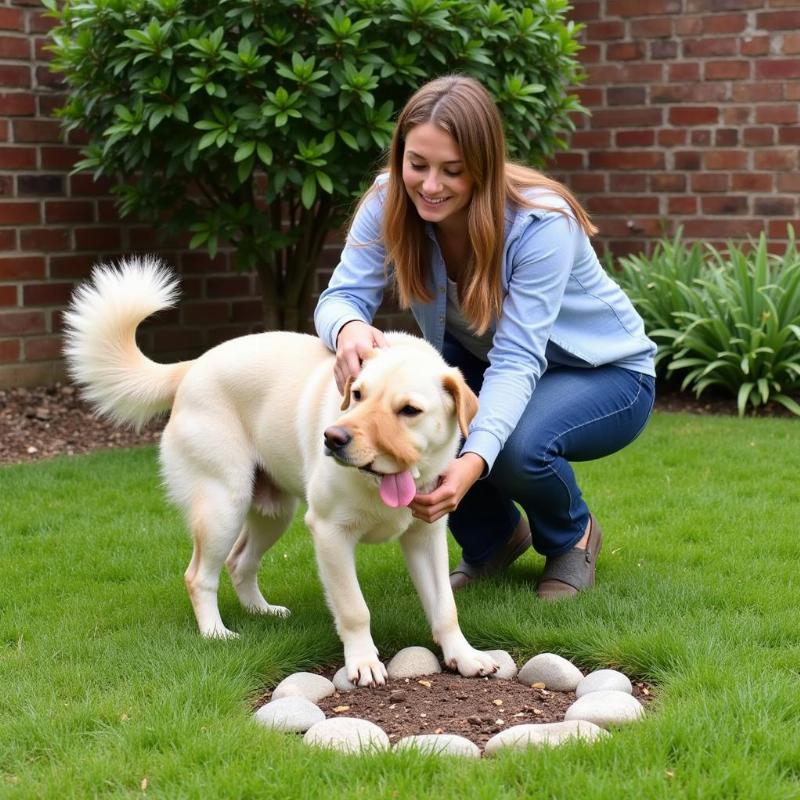Dog urine can create unsightly brown patches in your otherwise lush green lawn. This common problem frustrates many dog owners across America, leaving them wondering how to revitalize their yards. This article provides practical solutions and expert advice to help you understand why dog urine damages grass and, most importantly, how to fix dead spots in lawn from dog pee, restoring its beauty and health.
Understanding the Science Behind Dog Pee Spots
Dog urine is rich in nitrogen, which in concentrated amounts acts like a fertilizer overdose, scorching the grass blades. The high salt content can also dehydrate the soil, contributing to the brown patches. While female dogs tend to squat and concentrate their urine in one spot, causing more localized damage, male dogs often lift their leg and distribute urine over a wider area, leading to smaller, scattered spots. Understanding this difference can help you tailor your approach to lawn repair.
Practical Solutions to Repair Dog Pee Spots
Addressing dog pee spots requires a multi-pronged approach. First, flush the affected area with water immediately after your dog urinates. This dilutes the nitrogen and salts, minimizing damage. Regularly watering your lawn, especially during dry spells, also helps maintain its resilience. Consider designating a specific area in your yard for your dog to use as a bathroom. Training your dog to relieve themselves in this designated spot can concentrate the urine’s impact and make it easier to manage.
 Guiding a dog to its designated potty area
Guiding a dog to its designated potty area
Choosing the Right Grass for Your Dog
Certain grass types are more tolerant to dog urine than others. Fescue and ryegrass are generally considered more resistant. When reseeding or laying new sod, consider these durable options. You can also find specific grass seed blends marketed as “dog-friendly,” which are formulated to withstand the effects of urine.
Dietary Considerations for Reducing Lawn Damage
Believe it or not, your dog’s diet can play a role in the severity of lawn damage. A balanced diet with appropriate protein levels can help reduce nitrogen concentration in the urine. Consult with your veterinarian to determine the best diet for your dog’s breed, age, and activity level. They can recommend dog food options that are nutritionally sound and may contribute to a healthier lawn.
Preventing Future Damage
Prevention is always better than cure. Regularly watering your lawn, training your dog to use a designated area, and choosing a resistant grass type are proactive steps you can take. There are also commercially available products designed to neutralize dog urine and protect your lawn. These products can be applied to the affected areas or used as a preventative measure.
Conclusion: Restoring Your Lawn’s Beauty
Dealing with dead spots in your lawn from dog pee can be frustrating, but it’s a manageable problem. By understanding the science behind the damage and implementing the practical solutions outlined in this article, you can restore your lawn’s health and keep it looking its best. Remember to consult with your veterinarian about your dog’s diet and consider using commercially available lawn protection products for optimal results. With a little effort and the right approach, you can enjoy a beautiful lawn and a happy dog.
FAQ
- Does dog urine always kill grass? Not always, but concentrated urine can cause damage due to its nitrogen and salt content.
- What type of grass is best for dog owners? Fescue and ryegrass are generally considered more resistant to urine damage.
- Can changing my dog’s diet help? A balanced diet can help reduce nitrogen concentration in urine, minimizing lawn damage.
- How can I train my dog to use a designated potty area? Positive reinforcement with treats and consistent guidance can be effective.
- Are there products that can neutralize dog urine? Yes, commercially available products can help neutralize urine and protect your lawn.
- Is it necessary to flush the area with water after my dog urinates? Yes, this dilutes the urine and reduces damage significantly.
- How often should I water my lawn to prevent urine damage? Regular watering, especially during dry periods, helps maintain lawn health and resilience.
Beautdogs.us is your premier resource for dog lifestyle and care in the US. We provide expert advice on dog breeds, nutrition, training, and grooming, empowering dog owners with the knowledge and resources they need. From puppyhood to senior years, Beautdogs.us is your trusted companion on this amazing journey. Contact us for any questions or concerns at [email protected] or call us at +1 501-555-7529. Visit Beautdogs.us for more information.